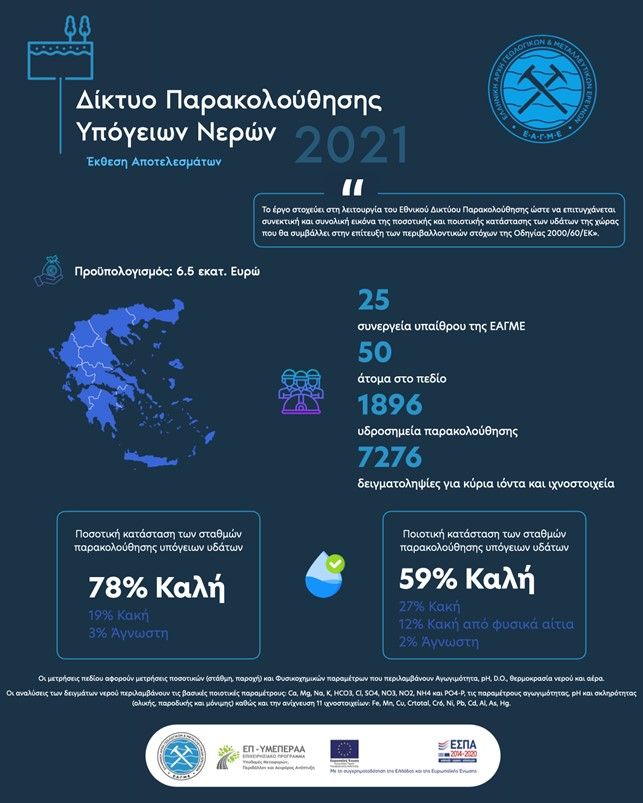The Hellenic Authority for Geological and Mineral Research (EAGME), within the framework of the project “Groundwater Monitoring Network” (DIPYN), has submitted the 2021 Results Report to the Directorate for the Protection & Management of the Aquatic Environment of the Ministry of Environment and Energy (YPEN).
The DIPYN project aims to operate the National Water Monitoring Network to achieve a coherent and comprehensive understanding of the quantitative and qualitative status of the country’s groundwater, contributing to the environmental objectives of Directive 2000/60/EC.
During 2021, three sampling and field measurement campaigns were conducted in April, July, and October. In total, 7,276 samples were collected for analysis of major ions, nitrogen and phosphate compounds, and trace elements from 1,896 monitoring sites distributed throughout Greece.
The fieldwork was carried out by 25 EAGME field teams consisting of 50 staff members, while the chemical analyses were conducted at the EAGME Water Analysis Laboratory.
The field measurements included:
- Measurements of groundwater levels in wells and boreholes, and spring discharge rates
- Measurements of physicochemical parameters (pH, electrical conductivity, dissolved oxygen, water and air temperature)
The laboratory analyses of water samples included:
- Major ions (Ca, Mg, Na, K, HCO3, Cl, SO4)
- Nitrogen (NO3, NO2, NH4) and phosphate (PO4-P) compounds
- Hardness (total, temporary, and permanent)
- Heavy metals/trace elements (Fe, Mn, Cu, Crtotal, Cr6+, Ni, Pb, Cd, Al, As, Hg)
Based on the available chemical analyses and field measurements, an assessment was carried out regarding the quantitative and qualitative status of the groundwater monitoring stations across the country.
Groundwater quality and quantity degradation issues were observed mainly in areas of intensive aquifer exploitation. Nitrate pollution and seawater intrusion were identified as the main causes of degradation, linked respectively to the use of nitrogen fertilizers and over-pumping leading to marine water intrusion. A small percentage of exceedances in concentrations of heavy metals, trace elements, and chloride ions were attributed to natural causes.
The results from the Annual Evaluation Reports of the DIPYN project are further utilized in the preparation of revised River Basin Management Plans, with the ultimate goal of informing water management policies and ensuring the sustainable use of groundwater resources.
The DIPYN project is funded by the Operational Programme “Transport Infrastructure, Environment and Sustainable Development” under NSRF 2014–2020 (2023).


